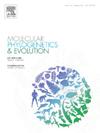Ecological divergence of marine bacteria Alteromonas mediterranea
IF 3.6
1区 生物学
Q2 BIOCHEMISTRY & MOLECULAR BIOLOGY
引用次数: 0
Abstract
Alteromonas mediterranea, originally designated as A. macleodii, is a deep-sea ecotype that plays an important ecological role in the ocean. However, a comprehensive understanding of their biogeographic distribution and evolutionary histories remains limited. In this study, our analysis indicated that A. mediterranea members could adapt contrasting marine ecosystems and flourish in nutrient-rich habitats such as feces and coral reefs. No significant correlations between the relative abundance of A. mediterranea members and the environmental variables were identified. Phylogenetic analysis and geographic patterns of A. mediterranea strains suggested that they could be clustered into two clades (clade Ⅰ and clade Ⅱ). In contrast, many distinct genomic traits exist between these clades, such as the complete genes encoding cytochrome o ubiquinol oxidase only involved in clade Ⅱ. Genes were more likely to be lost in the evolutionary history of A. mediterranea relatives. Gene loss might be a major force in all phylogenetic groups driving the distinct clades. Adaptation to different biotopes resulted in the functional differentiation of A. mediterranea members, with the loss of genes encoding carbohydrate-active enzymes. Genes acquired horizontally from unclassified bacteria, and Proteobacteria represented by Gammaproteobacteria played key roles in the functional diversification of A. mediterranea in marine habitats. Given these data, these results are useful for information supplementation of A. mediterranea strains, particularly for making significant advances in understanding marine microbial ecology within different clonal frames using genome-wide recruitments.

海洋细菌地中海交替单胞菌的生态分化
地中海交替单胞菌(Alteromonas mediterranea)是一种深海生态型,在海洋中具有重要的生态作用。然而,对其生物地理分布和进化历史的全面认识仍然有限。在这项研究中,我们的分析表明,地中海拟南芥可以适应不同的海洋生态系统,并在粪便和珊瑚礁等营养丰富的栖息地繁衍生息。结果表明,地中海沙蚤的相对丰度与环境变量之间没有显著的相关性。对地中海拟南芥的系统发育和地理分布分析表明,地中海拟南芥可分为Ⅰ和Ⅱ两个支系,但在这两个支系之间存在着许多不同的基因组特征,如细胞色素o泛醇氧化酶编码的完整基因只存在于Ⅱ支系中。基因更有可能在地中海古猿近亲的进化史中丢失。基因丢失可能是所有系统发育群体中驱动不同进化枝的主要力量。对不同生物群落的适应导致地中海稻的功能分化,编码碳水化合物活性酶的基因缺失。以Gammaproteobacteria为代表的变形菌门(Proteobacteria)和未分类细菌水平获得的基因在地中海拟南鲷的海洋生境功能多样化中起着关键作用。鉴于这些数据,这些结果对于补充地中海单胞杆菌菌株的信息是有用的,特别是对于利用全基因组招募在了解不同克隆框架内的海洋微生物生态方面取得重大进展。
本文章由计算机程序翻译,如有差异,请以英文原文为准。
求助全文
约1分钟内获得全文
求助全文
来源期刊
CiteScore
7.50
自引率
7.30%
发文量
249
审稿时长
7.5 months
期刊介绍:
Molecular Phylogenetics and Evolution is dedicated to bringing Darwin''s dream within grasp - to "have fairly true genealogical trees of each great kingdom of Nature." The journal provides a forum for molecular studies that advance our understanding of phylogeny and evolution, further the development of phylogenetically more accurate taxonomic classifications, and ultimately bring a unified classification for all the ramifying lines of life. Phylogeographic studies will be considered for publication if they offer EXCEPTIONAL theoretical or empirical advances.

 求助内容:
求助内容: 应助结果提醒方式:
应助结果提醒方式:


